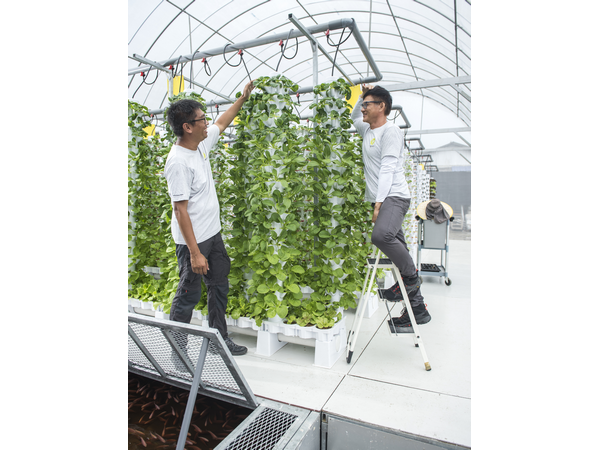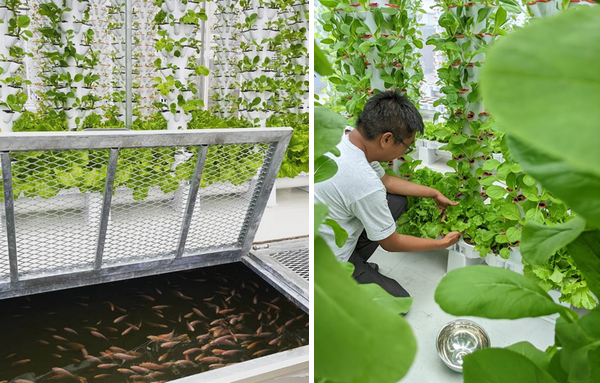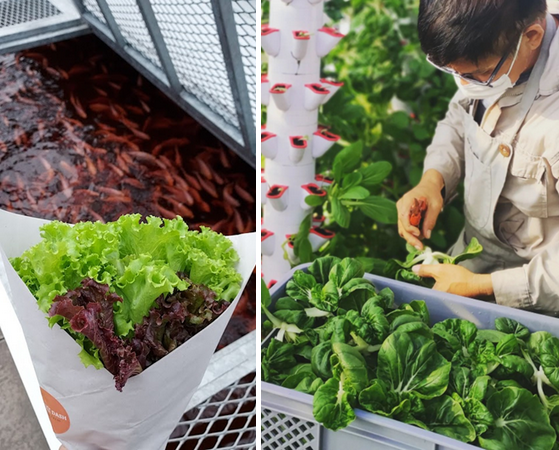“We want to be an enabler in different aspects, in terms of vertical- and urban farming, helping communities to grow locally. As an agtech, we want to supply customers with the know-how and the technology behind vertical farming that makes efficient growers," says Nelson Tan, founder of V+ Farm, a Singapore-based hybrid vertical farm.
It all started two years ago when Singapore went into lockdown and food security became a national issue. That made Nelson explore the options of producing locally and contributing to finding a solution. Promptly after, V+ Farm was invented and started experimenting with growing towers, combined with aquaponics. The company provides farm management consulting however, they both cultivate and advise farmers on vertical farming.
The main goal for the farm is to showcase potential prospects that this way of farming is viable for them. The current showcase farm is only 96m2 but can be easily upgraded if wanted. As long as there’s an unutilized space in a school or apartment complex, V+ Farm can set it up any time.

The founders
V+ Farm can help clients with how to utilize the space in the right way, help them with planning and help them through the regulations to achieve the guidelines. Besides the practical sense of things, the company can put together the hardware and walk them through the SOPs (Standard Operating Procedures) which comes down to end-to-end farm management.
“We wanted to challenge ourselves and go all-natural, using the ecosystem and balancing it out on growing food. There’s also an economic reason behind it as in Singapore, vegetables are mainly imported from the cheapest sources available. It’s hard to beat the price point as a local grower. We believe that in the end, we can become more operational and sustainable in our farming processes.”
Experimenting with different fish
The Singapore farm uses netting to keep pests and animals out, which is similar to a kind of greenhouse setting. In terms of fish production, Nelson gives away that they’re currently experimenting with different kinds of fish as they experienced that tilapia isn’t the most high-value product. “As there’s a lot of information available on using tilapia in aquaponics, we used that as our baseline. Now, we’re following the method we set up in our testing spaces to figure out the potential. Together with the National University of Singapore, we’re in the works on developing a microbial formula for different fish and crops.”

As for fruiting crops, V+ Farm has tried several, but as Nelson explains it’s very hard to combine lower pH levels with fish as it creates an unhealthy environment for the Animalia. According to Nelson, there’s a very thin line between tight control and a delicate balance of various growing parameters. “We’re going to be able to combine fruiting crops with aquaponics eventually, it’s just a matter of finding the right combination in our experiments.”
Every country has their own view on how they grow food, claims Nelson. “However, in Singapore there’s a palate for local greens. Government incentives are based on that too, so in a way, the government is pushing us to think about the national agenda first. That’s why we’re really encouraging our local production.”
Target audience
Breaking it down into the growing business. Helping the community we’re targeting civic societies, society,- town councils and schools. As long as they can gather the community together, providing them with farming know-how so that the communities can be helped. CorporatE: they’re more in the growing business.
Yields from a 1000sq ft farm are too small for the supermarkets. It’s also too small for restaurants- about enough to supply 2 restaurants. We can then target employee benefits, going to the office having fruits and snacks, we want to supply them with snacks – we sell the veggies to them. 20% of the business is in producing- we sell the produce to the corporations which can become a model to the communities as well, using production to raise funds. We want to lead by example to generate investments.

Modular setups
V+farm provides modular setups, they come in three sizes. The biggest setup is 1000 sq. ft. (96m2), the second biggest is 300 sq. ft. (28m2) and the smallest is 60 sq. ft. (6m2). All farming methods are based on aquaponics. Nelson points out that the 1000 sq. ft. farm is scalable to 5000 sq. ft. (465m2). As for now, the company’s target audience can be broken down into three categories: commercial farmers, communities and consumers. The 3 C’s.
Nelson wants to see V+ become a global company, they just happen to be located in Singapore with their testing facility. The plan is to expand the concept and method globally. Nelson’s eventual goal is to bring this model to the US, which he considers his second home. He spent a lot of time there and is certain the model would work there - with just a tiny few tweaks here and there.
 For more information:
For more information:
Nelson Tan, co-founder
nelson@vplus.farm
+65 981 888 14
V+ Farm
www.vplus.farm
